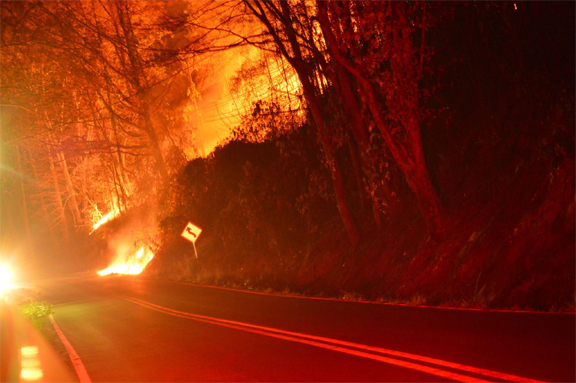As of Monday afternoon, there were 33 active wildfires being managed or monitored in Kentucky. Approximately 14,800 acres have burned through wildfires in the Commonwealth since Oct. 29.
Gov. Matt Bevin declared a state of emergency last week, as wildfires raged and dry conditions continue.

The fires included a 4-mile stretch of Pine Mountain and Black Mountain. Some of the biggest blazes have been in Harlan County.
Fifty-six counties have issued burn bans at this time: Adair, Ballard, Barren, Bath, Bell, Bourbon, Boyd, Breathitt, Butler, Calloway, Carlisle, Carter, Clark, Clay, Clinton, Cumberland, Edmonson, Elliott, Fleming, Floyd, Franklin, Fulton, Graves, Harlan, Harrison, Hart, Hickman, Jackson, Johnson, Knott, Knox, Laurel, Lawrence, Lee, Leslie, Letcher, Lewis, Livingston, Magoffin, Marshall, McCracken, McCreary, Monroe, Montgomery, Morgan, Nicholas, Owsley, Perry, Pike, Powell, Rockcastle, Rowan, Warren, Wayne, Webster, Whitley.
The Kentucky National Guard (KYNG) provided 6 helicopters for air assets in eastern Kentucky Monday, dropping 74 buckets of water, for a total of 584 buckets, with 350,400 gallons of water dropped since November 3. In addition, the Civil Air Patrol continues to provide aerial support.
The Kentucky Fire Commission reports the counties of Jefferson, Whitley, Boyd, Greenup, Jessamine, Spencer, Grant and Laurel sent fireman from Friday’s first deployment to assist with the fires. Monday’s relief deployment consisted of fireman from Ohio, Spencer, Warren, Estill, Menifee, Hardin, Rowan, Bullitt, Boone, Jefferson, Jessamine and Calloway Counties. The second deployment will last through Wednesday.
Monday afternoon the Federal Aviation Administration (FAA) established a 10-nautical mile buffer zone around the specified airports; (RGA) Richmond, (SJS) Big Sandy, LMP) Lonesome Pine, (1A6) Middlesboro, and (18I) McCreary County Airport) effective until 11:59 p.m. Nov. 17.
The notice is advising air traffic to “Exercise extreme caution below 2,000 ft AGL due to extensive military rotary wing traffic involved in firefighting activities and limited visibility due to smoke obscuration. Expect increased rotary wing traffic in and around surrounding airports through 17 Nov.”
Kentucky Emergency Management (KYEM) officials urge citizens to abide by the burn bans, be extremely cautious in all outdoor activities and if travelling in the impacted areas to have your vehicle headlights on for safety.

Smoke is made up of a complex mixture of gases and fine particles produced when wood and other organic materials burn. The biggest health threat from smoke is from fine particles, which can get into your eyes and respiratory system, where they can cause health problems such as burning eyes, runny nose, and illnesses such as bronchitis. Fine particles also can aggravate chronic heart and lung diseases – and even are linked to premature deaths in people with these conditions.
Find more information on the health effects of wildfire smoke here at: https://www3.epa.gov/airnow/smoke/Smoke2003final.pdf
For anyone encountering smoke from Kentucky’s wildfires, the EPA offers these wildfire smoke tips from its AIRNOW website: https://airnow.gov/index.cfm?action=topics.smoke_events
Use common sense. If it looks smoky outside, it’s probably not a good time to mow the lawn or go for a run. And it’s probably not a good time for your children to play outdoors.
Pay attention to local air quality reports. Stay alert to smoke-related news coverage or health warnings.
Visit AirNow.gov to find out the Air Quality Index in your area. As smoke gets worse, the amount of particles in the air changes – and so do the steps you should take to protect yourself. AirNow recommends precautions you can take to protect your health when air pollution gets bad.
If you are advised to stay indoors, take steps to keep indoor air as clean as possible. When smoke levels are high, try to avoid using anything that burns, such as wood fireplaces, gas logs, gas stoves – and even candles! Don’t vacuum. That stirs up particles already inside your home.
If you have asthma or other lung disease, make sure you follow your doctor’s directions about taking your medicines and following your asthma management plan. Call your doctor if your symptoms worsen.
Run your air conditioner if you have one. Keep the fresh air intake closed and the filter clean to prevent bringing additional smoke inside. Note: If you don’t have an air conditioner, staying inside with the windows closed may be dangerous in extremely hot weather. In these cases, seek alternative shelter.
If you have heart or lung disease, if you are an older adult, or if you have children, talk with your doctor about whether and when you should leave the area. When smoke is heavy for a prolonged period of time, fine particles can build up indoors, even though you may not be able to see them.
For additional information and resources, please go to www.kyem.ky.gov.
When posting to social media regarding the wildfires, please use #KyWildfires.


















Civil Air Patrol, the longtime all-volunteer U.S. Air Force auxiliary, is the newest member of the Air Force’s Total Force, which consists of regular Air Force, Air National Guard and Air Force Reserve, along with Air Force retired military and civilian employees. CAP, in its Total Force role, operates a fleet of 550 aircraft and performs about 90 percent of continental U.S. inland search and rescue missions as tasked by the Air Force Rescue Coordination Center and is credited by the AFRCC with saving an average of 78 lives annually. Civil Air Patrol’s 56,000 members nationwide also perform homeland security, disaster relief and drug interdiction missions at the request of federal, state and local agencies. Its members additionally play a leading role in aerospace education and serve as mentors to more than 24,000 young people currently participating in the CAP cadet program. Performing missions for America for the past 75 years, CAP received the Congressional Gold Medal in 2014 in honor of the heroic efforts of its World War II veterans. CAP also participates in Wreaths Across America, an initiative to remember, honor and teach about the sacrifices of U.S. military veterans. Visit http://www.capvolunteernow.com for more information.